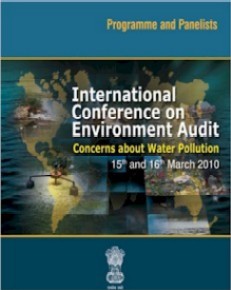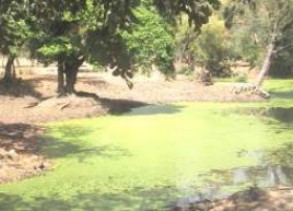/sub-categories/research-papers
Research Papers
Draft paper on 'Monitoring Compliance of Environment / CRZ clearance conditions A New Approach'
Posted on 16 Sep, 2010 03:26 PM
Please consider signing this online petition drafted by the Environmental Support Group, who have been AID's partner for 10 years now (esgindia.org). This letter is regarding a 'Draft Paper' on 'Monitoring Compliance of Environment/CRZ clearance Conditions – A New Approach' drafted by an in-house Review Committee constituted on 25th August 2010 by the Ministry of Environment and Forests.
Vertical distribution of groundwater – A presentation by ACWADAM
Posted on 12 Sep, 2010 01:22 PMThis presentation by ACWADAM explains the occurrence of groundwater and deals with the vertical distribution of groundwater. To begin with, the openings in rocks in the zone of rock fracture such as intergranular openings, vesicles in volcanic rock, joints & fractures and solution cavities are described.
International conference on environment audit - Concerns about water pollution - CAG (2010)
Posted on 10 Sep, 2010 05:15 PM This link on the CAG website provides the details of an international conference that was held on 15-16 March 2010, in the backdrop of the environmental audit proposed by the the Comptroller and Auditor General (CAG) of India, for management and conservation of the environment .
This link on the CAG website provides the details of an international conference that was held on 15-16 March 2010, in the backdrop of the environmental audit proposed by the the Comptroller and Auditor General (CAG) of India, for management and conservation of the environment .
The purpose of this conference was to deliberate on the causes of pollution, action taken by governments and civil society to address this and environmental, management and legal interventions needed to put lakes, rivers and ground water on the path of sustainability.
More than 20 experts on water and water pollution issues were invited to share their views as panelists during the conference. Apart from these distinguished panelists, the heads of supreme audit institutions from countries like Austria, Maldives, Bangladesh and Bhutan were also present to share their experiences regarding audit of water pollution in their countries.
Restoration of traditional small water bodies in Braj - The South Asian Journal of Tourism and Heritage
Posted on 01 Sep, 2010 02:28 PM This paper published in the South Asian Journal of Tourism and Heritage begins by highlighting the importance of the traditional small water bodies in Braj, commonly known as kunds, as important freshwater sources as well as an important part of the culture and the traditions of the area.
This paper published in the South Asian Journal of Tourism and Heritage begins by highlighting the importance of the traditional small water bodies in Braj, commonly known as kunds, as important freshwater sources as well as an important part of the culture and the traditions of the area.
There were 1000 such kunds, which used to be the source of fresh water in Braj in earlier times. The water was used for multiple purposes like irrigated agriculture, domestic uses, drinking water for cattle, bathing etc. Due to rapid urbanisation, lack of maintenance and prolonged negligence in the last 50-100 years, most of the kunds today have become silted up and are nearing extinction.
The impending crisis for fresh water has forced the planners and policy makers to take cognizance of these traditional water bodies and an urgent need has been identified for taking necessary measures to restore the kunds. The present study thus aims at understanding the reasons for deterioration of the kunds and makes some technical suggestions for revival of these kunds.
Rapid investigations to assess impacts of aquifer recharge - Tumkur district (Karnataka) - A report by ACWADAM and BIRD-K
Posted on 01 Sep, 2010 02:19 PMThis report by ACWADAM is a synopsis of the hydrogeological study carried out for BIRD-K in Pavagada, Sira and Bagepalli areas of Tumkur District, Karnataka. The study aimed at an impact analysis of recharge through borewells as well as suggesting new sites for the same.
The principle objectives of the study were:
- Impact analysis of aquifer recharge through borewells done by BIRD-K in Pavagada and Sira Clusters
- Suggest new sites for aquifer recharge through borewells in Bagepalli cluster.
The methodology used a background study of the area through images from Google Earth. A detailed geological fieldwork in the area was carried out. Various structural and hydrogeological measurements were made to map out the aquifer systems within the area. Water levels in borewells and dug wells were measured. The study area included seven watersheds and falls in two clusters namely Pavagada and Sira. Both these clusters are located in the Tumkur district of Karnataka.
Inspiring progress: Learning from Exnora Green Pammal's solid waste management partnerships in four localities
Posted on 01 Sep, 2010 02:16 PMThis booklet by Exnora Green Pammal (EGP) begins by highlighting the grave situation in relation to solid waste management in the country and the steps undertaken by the government to tackle this issue. The document presents a review of the efforts undertaken by EGP, an NGO based in Chennai, which has been implementing solid waste management projects with a variety of local bodies in accordance with the government’s rules.
India’s solid waste crisis is undermining the nation’s efforts to improve public health, protect the environment and stop climate change. India produces a staggering amount of municipal solid waste every day and the rate of production is expected to climb steadily as the nation becomes more populated, urbanised and economically developed.
Although the Indian government has enacted rules for management and handling of municipal solid waste, the results as per the year 2010 indicate that most localities have not fully complied with the rules and the situation has found to be getting worse day by day. Widespread, prolonged noncompliance with the rules and the rapid, highly-visible environmental degradation has led to calls for a changes in the nation’s waste management policy.
Babhli water conflict: Less water, more politics - EPW article
Posted on 01 Sep, 2010 02:13 PMThis paper published in the Economic and Political Weekly highlights the recently growing conflicts over water sharing between states in India and argues that the intensity and periodicity of these conflicts are increasing and that these conflicts are expected to get worse with the increasing uncertainty of rainfall and water availability. The document goes on to describe the latest one in the news, the conflict between Maharashtra and Andhra Pradesh over the Babhli barrage.
Rainwater harvesting initiatives in Bangalore - A paper by KSCST
Posted on 29 Aug, 2010 12:10 AMThis paper by AR Shivakumar of the Karnataka State Council for Science and Technology (KSCST), presented at a national seminar organised by ISRO at NIAS Bangalore in 2010, begins by highlighting the increasing problem of scarcity of water that the city of Bangalore has been experiencing in recent years and suggests a required plan of action for a sustainable water supply system in the city.
Karst Hydrogeology – A presentation by ACWADAM
Posted on 27 Aug, 2010 12:42 AMThis presentation by ACWADAM deals with Karst hydrogeology, a term used to denote the topography over limestones, dolomites or gypsum rich rocks where there are sinkholes, caverns and lack of surface streams. Karst mainly refers to carbonate rocks: Limestones (CaCO3) or Dolomites (MgCa[CO]).
The formation of carbonate rocks can be traced to physical and chemical deposition. Physical deposition is clastic in nature formed by deposition of particles carried in suspension. It is marked by higher primary porosity and low secondary porosity. Chemical deposition is in the form of precipitate formed by deposition of particles from solution. Contrary to physical deposition it is marked by low primary porosity and high secondary porosity.

Measurement of weather parameters: Data collection and analysis – A presentation by ACWADAM
Posted on 24 Aug, 2010 09:29 PMThe presentation by ACWADAM deals with measurement of weather parameters and outlines the methods used in weather related data collection and analysis. Weather information is necessary for the planning and implementation of watershed programmes, especially in understanding factors like groundwater recharge, the relationship between recharge & discharge and in aspects like irrigation planning.